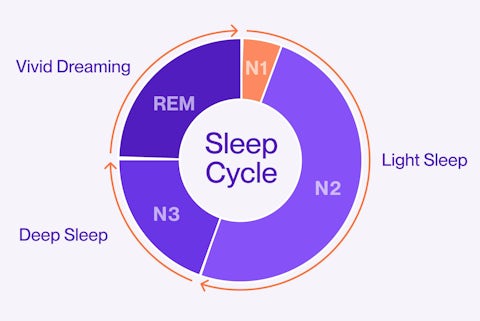How to Sleep Better - 20 Tips for a Good Night Sleep
 Andrew Jolie March 05, 2024 9 min read
Andrew Jolie March 05, 2024 9 min read
Are you craving a night of deep, uninterrupted sleep?
Getting a good night’s sleep is more important than you might think. It’s not just about feeling rested. Quality sleep can improve your mood, boost your brainpower, and even help you stay healthy. Improving sleep quality involves a combination of good sleep hygiene, environmental adjustments, lifestyle changes, and, sometimes, mindfulness or relaxation techniques. If you’re serious about tackling your sleeping problem and want to avoid it becoming a sleep “disorder”, here are 20 practical tips to help you sleep better
1. Stick to a Schedule
Maintaining a regular sleep schedule aligns your circadian rhythm, facilitating quicker sleep onset and improving sleep quality by optimizing melatonin levels and sleep stage progression. This consistency benefits sleep and enhances mood, cognitive function, and metabolic health, highlighting the broad impact of a stable sleep pattern on overall well-being and daily alertness. A very useful habit to start.
2. Rollout a Relaxing Routine
Creating a calming pre-sleep routine, including reading, taking a warm bath, or relaxation techniques, can improve your sleep quality and speed up falling asleep. These activities tell your body to wind down, effectively reducing stress and promoting better mental health. Incorporating this as a nightly routine lays the groundwork for better sleep and calmness.
3. Dark and Quiet:
To enhance your sleep, make your bedroom dark, quiet, and cool using blackout curtains, a sleep mask, and earplugs if you live in the noisy, bright city. These steps improve sleep quality and comfort.
4. Nix the Screens:
Avoiding screens before bed is vital to sleep better, as blue light from devices can disrupt melatonin production and delay sleep. Establishing a no-screen rule an hour before bedtime helps your body prepare for rest, improving sleep quality. This habit significantly improves both your physical and mental health.
5. Regulate your Foodiness
Avoid heavy meals, like greasy foods, that cause digestive discomfort and make you feel worse when lying down. Try to eat 2-3 hours before bedtime to give your body time to digest the meal, and substitute lean protein and veggies for the greasy stuff. If you suffer from heartburn, make sure to leave out acidic foods.
6. Move More, Sleep Better
Regular exercise enhances sleep quality through stress reduction, body temperature regulation, and circadian rhythm synchronization. The endorphins released during physical activity promotes relaxation and prepares the body for sleep. Natural light exposure during exercise also supports a healthy sleep-wake cycle. Timing matters. Avoid vigorous exercise close to bedtime, instead opting for something like yoga to encourage relaxation. Properly timed exercise and enough rest maximizes sleep quality and overall health.
7. Limit Nap Times
Regulating your nap times is essential for preserving nighttime sleep quality. Long or sporadic naps can disrupt your natural sleep cycle, making falling or staying asleep at night harder. To avoid this, if napping is necessary, it’s advisable to keep it short—aiming for 20-30 minutes—and to nap earlier in the day. This allows you to benefit from the restorative power of a quick snooze without compromising getting deep, restful sleep at night.
8. Lessen the Stress
Effectively managing stress through techniques like meditation, deep breathing, or yoga can significantly lower anxiety levels and enhance sleep quality. Sure, it’s easier said than one, but these practices help calm the mind and relax the body, making falling asleep easier and enjoying more restorative rest. Making a habit of these activities in your daily routine helps reduce day-to-day stress. It prepares your body for a peaceful night’s sleep.
9. Let the Sunshine In
Get out there in the sunshine! Exposure to natural light, especially in the morning, is important to synchronize your body’s sleep-wake cycle. It helps regulate the production of melatonin, a hormone that signals your body when it’s time to sleep and wake up. Incorporating time outdoors into your daily routine can enhance your circadian rhythm, improving sleep quality and making wakefulness easier in the morning. Going out into natural light daily can impact your overall sleep health, reinforcing the natural patterns for restful sleep and alert wakefulness. Enjoy the rays.
10. Skip the Stimulants
A lot of us like our caffeine or our glass of wine to wind down. But you’ll want to try and avoid caffeine and alcohol prior to bedtime. Caffeine can disrupt sleep by keeping you alert, and alcohol can cause sleep disturbances, snoring, and dehydration. Try not to drink anything caffeine at least 6 hours before bedtime and limit the alcohol. If you want to enjoy your glass of wine, try doing that about 3-4 hours before bedtime while staying hydrated to minimize the impact for a better sleep.
11. Rest & Romance Only
Reserving your bed exclusively for sleep and sexy-time is necessary to reinforce the psychological association between your bed and rest. Activities like working, eating, or watching TV in bed can blur these boundaries, making it harder for your mind to associate the bed with relaxation and sleep. By keeping these activities separate, you make sure that your bed remains a cue for sleepiness and intimacy, which can improve the quality of your rest. This clear distinction helps you to fall asleep more quickly. Funny how the mind works, isn’t it?
12. Embrace Soothing Rituals
Have you ever tried practicing progressive muscle relaxation or guided imagery? This can be a big help with your bedtime routine and can prepare your mind and body for sleep. These methods help to reduce physical tension and mental stress, creating an ideal state for transitioning into rest. You encourage a sense of tranquility and readiness for sleep, facilitating easier onset and a deeper, more restorative sleep. Adopting these practices can be a powerful tool in improving sleep quality, as they directly address and reduce factors that commonly hinder sleep.
13. White Noise = Peace:
A white noise machine or app can effectively mask disruptive sounds, providing a steady sound environment that facilitates easier sleep by drowning out noise like traffic or snoring. This continuous, stable background noise can improve sleep quality, especially in noisy settings, making it a simple but powerful addition to your sleep routine for better rest and overall sleep health.
14. Cool for Quality Sleep
Keeping your bedroom at a fairly cool temperature, around 65°F (18°C), is excellent for good sleep since a cooler environment helps the body’s natural cooling process needed for sleep. Adjusting your room to be cooler signals your body it’s time to rest, making it easier to fall and stay asleep. (Another mind/body connection for you.) This simple adjustment can significantly enhance sleep quality.
15. Get Cozy Bedding:
Investing in comfortable, cozy quality bedding can dramatically improve your sleep by increasing comfort and support, and cutting the time it takes to fall asleep and reduce nighttime awakenings. Box spring beds are an incredible investment. Feels like sleeping on a could. Investments like this can help you get a deeper, more restorative sleep.
16. Fewer Liquids, More Zzz’s
Reducing fluid intake before bedtime can help prevent frequent nighttime bathroom trips, promoting uninterrupted and restful sleep. Too much tea and you gotta pee. This straightforward strategy enhances sleep quality by minimizing disruptions, making it a practical component of good sleep hygiene for a better night’s rest. But, have a glass of water on your nightstand and drink as much as possible in the morning as soon as you wake up. Sunlight and water will help you feel energized and ready to start the day.
17. Perfect Your Sleep Pose
Watch your sleep position for better health and comfort. It influences sleep quality and can address issues like snoring and sleep apnea. There’s nothing like waking up to the sound of your own snoring. Side sleeping, for example, promotes open airways. Proper pillow and mattress support is essential for optimal spinal alignment and pain reduction, ensuring a more restful sleep.
18. Sleep Scent Solutions:
Aromatherapy, especially with lavender, can enhance your sleep by promoting relaxation. Lavender’s calming effects can lower heart rate and blood pressure, setting the stage for better sleep. Essential oils, diffusers, or scented candles can transform your bedroom into a tranquil space, simplifying falling asleep and improving sleep quality. Live it up and get your bedroom smelling like a dream.
19. Track Your Zzz's
If you’re used to journaling, keeping a sleep diary will be a cinch. It can significantly improve your sleep quality by helping you track and understand patterns and habits that affect your rest. This insight allows for adjustments in your routine to address factors like caffeine intake and stress, potentially enhancing sleep. It’s also useful for discussions with your doctor if you’re struggling with sleep disorders. Write it down.
20. Dream in Darkness
Sleep masks effectively block out light, but a smart sleep mask, like the Bía Smart Sleep Mask, offers advanced features for enhanced sleep quality and user convenience. Incorporating neurofeedback technology and built-in audio systems that play relaxing neural music, it’s designed for comfort across all sleeping positions and includes a natural sunrise wake-up feature. The Bía Smart Sleep Mask presents a holistic approach to improving sleep by combining various sleep-enhancing technologies.
FAQs
How do you increase deep sleep?
To increase deep sleep, maintain a consistent sleep schedule, ensure your sleeping environment is dark, cool, and quiet, avoid caffeine and heavy meals before bedtime, and engage in regular physical exercise during the day.
How many times is it normal to wake up at night?
It’s common for adults to wake up briefly between sleep cycles, typically 1-2 times per night. However, waking up more often than this could indicate a sleep disorder or poor sleep hygiene.
How to get a good night’s sleep and wake up refreshed?
To wake up feeling refreshed, establish a relaxing bedtime routine, limit screen time right before bed, keep your bedroom perfect to sleep (cool, dark, and quiet), and aim for 7-9 hours of quality sleep per night.
How to naturally increase sleeping hormones (melatonin)?
Increase natural melatonin production by reducing exposure to blue light in the evening, sleeping in a completely dark room, and maintaining a regular sleep schedule. Sunlight in the morning helps, too. Also, consider eating foods rich in tryptophan, magnesium, and melatonin, such as nuts, seeds, and cherries.


